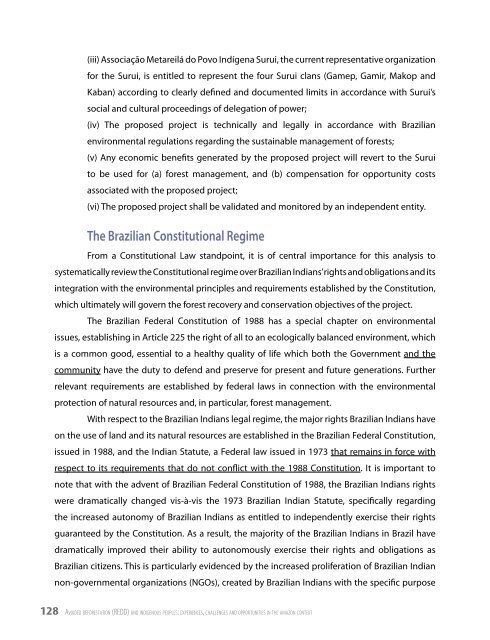Avoided Deforestation (REDD) and Indigenous ... - Amazon Fund
Avoided Deforestation (REDD) and Indigenous ... - Amazon Fund
Avoided Deforestation (REDD) and Indigenous ... - Amazon Fund
You also want an ePaper? Increase the reach of your titles
YUMPU automatically turns print PDFs into web optimized ePapers that Google loves.
(iii) Associação Metareilá do Povo Indígena Surui, the current representative organization<br />
for the Surui, is entitled to represent the four Surui clans (Gamep, Gamir, Makop <strong>and</strong><br />
Kaban) according to clearly defined <strong>and</strong> documented limits in accordance with Surui’s<br />
social <strong>and</strong> cultural proceedings of delegation of power;<br />
(iv) The proposed project is technically <strong>and</strong> legally in accordance with Brazilian<br />
environmental regulations regarding the sustainable management of forests;<br />
(v) Any economic benefits generated by the proposed project will revert to the Surui<br />
to be used for (a) forest management, <strong>and</strong> (b) compensation for opportunity costs<br />
associated with the proposed project;<br />
(vi) The proposed project shall be validated <strong>and</strong> monitored by an independent entity.<br />
The Brazilian Constitutional Regime<br />
From a Constitutional Law st<strong>and</strong>point, it is of central importance for this analysis to<br />
systematically review the Constitutional regime over Brazilian Indians’ rights <strong>and</strong> obligations <strong>and</strong> its<br />
integration with the environmental principles <strong>and</strong> requirements established by the Constitution,<br />
which ultimately will govern the forest recovery <strong>and</strong> conservation objectives of the project.<br />
The Brazilian Federal Constitution of 1988 has a special chapter on environmental<br />
issues, establishing in Article 225 the right of all to an ecologically balanced environment, which<br />
is a common good, essential to a healthy quality of life which both the Government <strong>and</strong> the<br />
community have the duty to defend <strong>and</strong> preserve for present <strong>and</strong> future generations. Further<br />
relevant requirements are established by federal laws in connection with the environmental<br />
protection of natural resources <strong>and</strong>, in particular, forest management.<br />
With respect to the Brazilian Indians legal regime, the major rights Brazilian Indians have<br />
on the use of l<strong>and</strong> <strong>and</strong> its natural resources are established in the Brazilian Federal Constitution,<br />
issued in 1988, <strong>and</strong> the Indian Statute, a Federal law issued in 1973 that remains in force with<br />
respect to its requirements that do not conflict with the 1988 Constitution. It is important to<br />
note that with the advent of Brazilian Federal Constitution of 1988, the Brazilian Indians rights<br />
were dramatically changed vis-à-vis the 1973 Brazilian Indian Statute, specifically regarding<br />
the increased autonomy of Brazilian Indians as entitled to independently exercise their rights<br />
guaranteed by the Constitution. As a result, the majority of the Brazilian Indians in Brazil have<br />
dramatically improved their ability to autonomously exercise their rights <strong>and</strong> obligations as<br />
Brazilian citizens. This is particularly evidenced by the increased proliferation of Brazilian Indian<br />
non-governmental organizations (NGOs), created by Brazilian Indians with the specific purpose<br />
128 Av o i d e d d e f o re s t A t i o n (redd) A n d i n d i g e n o u s p e o p l e s: experiences, chAllenges A n d o p p o r t u n i t i e s in t h e A m A zo n c o n t e x t
















